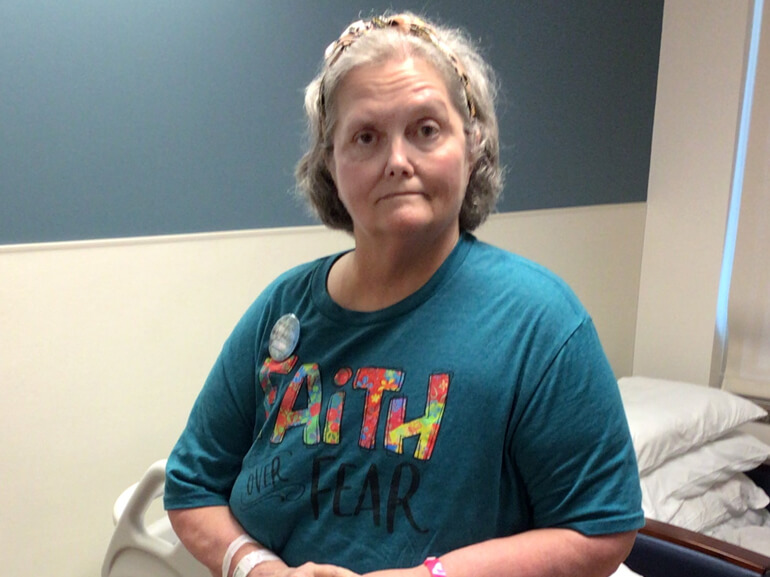Delvia's Story

Delvia McMillin, 60, lives with her sister and her daughter’s family in Covington, LA. Prior to her hospitalization, Delvia enjoyed an independent lifestyle that included swimming and walking for exercise.
Delvia was alarmed when she started experiencing chest pains. She went to the St. Tammany Hospital ER to get checked out, where she was admitted for continuing chest pains and fluctuating blood pressure. After admitting, she experienced an intense headache and noticed vision changes on her left side. She promptly alerted her nurse, a rapid response was called and a CT scan was performed. The scan showed that she had a medium-to-large brain bleed. Additional tests determined that her chest pains were caused by blockages requiring ongoing monitoring.
Over the next four days, Delvia’s intense headache continued, her eyesight worsened in her left eye and she had progressing left-sided weakness. Delvia’s medical team decided against surgery for the brain bleed, instead opting for close monitoring. Once Delvia was stable, her medical team advised that she continue her recovery and monitoring at an inpatient rehabilitation hospital. Her doctor’s suggestion was Northshore Rehabilitation Hospital.
When admitted, Delvia couldn’t see out of her left eye or walk due to weakness on her left side. She was also dependent on assistance for all self-care needs. Initially uncertain about rehabilitation, Delvia said, “Once I got to Northshore and saw how nice everyone was, I knew it would be ok.” She immediately set a goal to regain strength on her left side and improve her walking.
In physical therapy, Delvia’s therapists worked on getting her to stand, then to walk in the parallel bars and finally progress to walking with a walker. Her physical therapy team also improved her leg strength using resistance bands, chair exercises and stair climbing.
Delvia’s occupational therapists directed her in new and safe ways to perform self-care tasks such as bathing, dressing and using the bathroom. They also provided adaptive tools to help with dressing. Her occupational therapy sessions focused on increasing arm strength through a variety of exercises using an arm bike and resistance bands. The therapy team also engaged Delvia in vision exercises to help strengthen her left-sided eyesight.
A turning point in therapy for Delvia was about a week into her stay when she was able to walk with assistance to her bed. Delvia’s family support was also very motivating and instrumental in her recovery journey.
Three weeks after admitting to Northshore Rehabilitation Hospital, Delvia could walk up to 170 feet with a walker and perform all basic self-care tasks with supervision. She discharged home where she was most looking forward to spending time with family and her dog.
Asked what she learned about herself during recovery, Delvia said, “I learned I am strong.” She also imparted this advice to others on a recovery journey: “When you get here, you’ve got to put the work in and believe you can do it.”